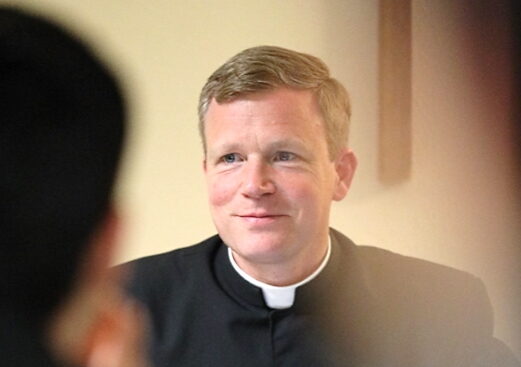For eleven years, P. Konstantin Ballestrem, L.C., has been a novice instructor. In the following lines, he expresses, together with P. Sylvester Heereman, L.C., his thoughts on the future of vocational pastoral work of the Legionaries of Christ in Germany.
Since 2010, the novitiate of the Legionaries of Christ in Germany was under the guidance of P. Konstantin Ballestrem, L.C. Looking back, he says: “What gave me the greatest joy as a novice instructor was experiencing how much the Holy Spirit does in each soul to bring out the vocation.” After eleven years of work in vocational pastoral care in Germany, he speaks in this interview, together with P. Sylvester Heereman, L.C., about his experiences as a spiritual director of young men discerning the priesthood, as well as about his own vocational path; they also answer questions related to societal changes, the Church, and the future of vocations promotion in Germany.
P. Konstantin, soon you will move from Bad Münstereifel to Königstein. Why take on a new pastoral mission in the Regnum Christi in Germany now?
P. Konstantin: In our congregation, novice instructors are appointed for an indefinite period, whereas other roles are assigned for a period of three to six years. Therefore, as you can see, the horizon for novice instructors is not limited. Perhaps it’s because, in the tradition of the Church, there is a saying that “over time, a novice instructor improves.” Anyway, after a certain time, a change is always good. We want to create in Königstein a place where people find a spiritual home, where they can experience Christian spirituality and communion with others, as well as participate in formation courses and evangelization programs. In fact, I already wish to dedicate myself to the new mission entrusted to me by my superiors.
After high school and some semesters studying Law, you entered the congregation of the Legionaries of Christ. But how did you end up becoming a novice instructor?
P. Konstantin: Back then, I was a formator in Rome, when one day I participated in a formation meeting with the General Director, who was also a member of the same formation team… when he entered, he announced that there would be some personnel changes in various nations. That’s how, in 2010, I was assigned the role of novice instructor; I was the first German-speaking Legionary of Christ to receive this assignment. I took over from P. John Luxbacher, LC, and returned to a house that was very well cared for. In fact, a few years earlier, I had done my apostolic internship there as an assistant to the novice instructor. I was very grateful for that assignment, to help our young brothers on their vocational path, because I had enjoyed serving them in their formation even as an assistant. Additionally, I had always appreciated the community prayer times, the opportunity for adoration, and the firm schedule of our formation houses.
How many novices have you accompanied during that time on their path to the priesthood?
P. Konstantin: A total of 78 novices, some lasted a few weeks, others months, and some remained for the full two years until religious profession. Of these, 29 are still with us, and this year, the first of them will be ordained deacons. It’s wonderful for me to see how they are reaching that goal. What gave me the greatest joy as a novice master was witnessing how much the Holy Spirit does in each soul to bring out the vocation. Also, exercising spiritual fatherhood—something very beautiful for a priest—brought me a special joy, and I experienced this directly in the novitiate. My biggest challenge was working and discerning with young men, who did not know with certainty what was a vocation and what was not, ensuring that this was made clear in each case. To clarify this, spiritual accompaniment must be very diligent and persevering, so that the young man feels comfortable and at peace with it.
For the Legionaries of Christ, thorough and solid formation, up to date, plays a central role. However, it must be taken into account that it is funded exclusively by donations and benefactors. What has been your experience with this in the day-to-day life of the novitiate?
P. Konstantin: Throughout all these years, as a novice instructor, my brothers and I have always marveled at the generosity of so many men who support us. Occasionally, I would read to the novices the letters from benefactors—either anonymously or, if they knew the persons, also mentioning their names—showing how much these men care about the formation of future priests, how they pray constantly for their solid priestly formation, oriented toward holiness, and how much benefactors appreciate our priestly work in today’s world. This greatly motivated the novices because they saw that these men cared deeply about their proper formation. A special spiritual closeness to the people was felt during the novena prayers in the novitiate. For a novice on the path to the priesthood, it means a lot to be able to intercede for others.
The move to Alzgern (near Altötting) in 2014 was a great challenge for our novitiate community. Due to the growth of the apostolic school in Bad Münstereifel, it became necessary. In this phase, we often experienced how Providence guided and helped us, especially through our benefactors. Today, the prayer and meeting house is expanding into a living spiritual center of Regnum Christi in Bavaria, a House of Apostles, where more priests are working than during the novitiate period. We also see Providence in this, because these stable places of experience and renewal of faith, as spiritual centers, have become important. We experience this time and again: where priests or the consecrated women of Regnum Christi live in stable communities according to our vocation, we see that we can also be people who prepare and accompany the path of growing faith communities. These spiritual centers are mainly run by lay members of Regnum Christi.
Society and the Church are changing, and in our times, notable adjustments are being made, but there are also new sprouts. How do the Legionaries of Christ adapt to this situation? What does this mean for the formation of new generations of priests?
P. Konstantin: In recent years, the formation we provide to candidates for the priesthood has changed significantly. First of all, it has become more personal. We have refined our methods, which requires more discernment from the novice instructor; humanly, this also causes more fatigue. Today, for example, personal conviction is prioritized because from it stem good and deep habits that must also be nourished in all areas of religious and priestly life.
About three years ago, our congregation changed its general formation plan to better suit new generations: it is preferred that novices do their novitiate in their own territory, which is why fewer people come from countries like Mexico or the United States.
What developments do you see in young people today who are considering a vocation to religious life or the priesthood? Are they different from those when you entered the novitiate? Are they strongly marked by the faith life they previously led?
P. Konstantin: In the 25 years that have passed, much has changed since I received my own formation, including in the culture of our society that influences young people. Young people now think longer about whether they really want to join a congregation, commit forever to the three evangelical vows, or whether they can undertake this while remaining faithful. This is an ongoing topic that keeps emerging.
Many are also not yet ready to make these decisions because they carry a large number of unresolved issues, pending matters, such as various wounds from the past, or areas in their psyche and heart that have not yet matured or been healed.
Traditionally, what we call our “candidate period,” a phase before entering the novitiate, lasts quite short, even though the novitiate itself lasts two years. Therefore, I think it makes sense to establish an earlier phase, during which young people can, for example, live with an apostolic community. In our houses of apostles, they should have the opportunity to experience a community of religious and priests, who accompany them in their pastoral service and prayer life, so they can practically and immediately experience what religious life is about. At the same time, they should have a regular prayer life, periodic spiritual accompaniment, and receive assistance in their vocational discernment. Additionally, they could study or collaborate in apostolic work. A period like this, which in religious life is also called “postulancy,” aims to be our response to the reality from which today’s young people come to meet us.
What are your prospects regarding the entry of new generations into the religious life of the Legionaries of Christ in Germany?
P. Konstantin: In recent years, the number of vocations from German-speaking countries has remained stable, with one to three novices each year, but this is not enough to keep a novitiate running reasonably. Therefore, starting this fall, there will be a European novitiate in Madrid with a German-speaking novice instructor, P. Nikolaus Klemeyer, LC. I think this is an appropriate and good response to the global situation. I greatly appreciate P. Nikolaus, who, with great competence, helped me as an assistant during the novitiate from 2016 to 2019. This makes it possible to ensure healthy continuity in the formation of novices.
P. Sylvester, since last fall you have been working at the House of Apostles of Regnum Christi in Alzgern. Primarily, you give talks and spiritual exercises for young adults. During your time as Vicar General in Rome and later in the general council of the Legionaries of Christ, your area of competence was the formation of new religious generations. Is it true that young people today require more intense spiritual accompaniment before entering the novitiate?
P. Sylvester: I perceive that we, as a community, are also struggling to attract vocations and feel the Lord’s call to reflect on our way of working with young people. We must always ask ourselves if we are helping them discover what it means to live with Jesus Christ, to go deeper and into the freedom of a life lived as His disciple, and to experience a community of faith.
What does this mean for the future of vocational pastoral work of the Legionaries of Christ in Germany?
P. Sylvester: First of all, we want to strengthen the foundations that serve as the basis for the call to a consecrated life, that is, what we just mentioned as an approach to discipleship. For some time now, we have been directing our efforts toward this: in our work with young people, with the vocations center, and with our proposal for young people to give a year as Regnum Christi Collaborator. But entering the novitiate represents a profound break. Because from there, the novice will live a completely new style of life, which, on the one hand, should be gradually prepared for, and on the other hand, does not fully correspond to the future priestly ministry, which is a quite active life and develops in collaboration with consecrated women and laypeople. The novitiate, however, is marked by a monastic style of life because it aims to be a desert experience that truly allows one to verify the call. But it’s not good to enter immediately into that experience without first having tested whether one truly wants to live the life of a Legionary of Christ as it is later in reality.
The vocational center of Bad Münstereifel has existed since 2008 and is understood as a place of discernment for young people who possibly feel called to the priesthood. What developments do you see there?
P. Sylvester: Bad Münstereifel will continue to be an important place for us for discernment and vocational clarification. Currently, there are 35 young men in the program. This summer, we welcomed as many new boys as never before. When we talk about “vocations,” we do not automatically or exclusively think of “novices.” First of all, we see that even today, God touches young people and calls them to follow Him according to their age. Of course, this is a very long and individual path; but since the first class finished high school (2012), we have seen that the vocational center has given each one a set of very valuable elements for their journey.
Father Konstantin spoke of a postulancy that the Legionaries of Christ would offer to young people before the candidate period and novitiate. How would this be structured?
P. Sylvester: The postulancy will last approximately nine months, during which interested persons will live, for example, in one of our Houses of Apostles, thus experiencing community life with active Legionaries of Christ and, so to speak, the final result of formation: the life of a Legionary of Christ as it truly is. But they will still be laypeople, without religious discipline and without abandoning regular contact with their circles of friends and family. The postulancy will have its own form, with more time dedicated to prayer, collaboration in apostolic work, time for studying relevant topics for vocations, with special experiences such as pilgrimages and missions, and opportunities to get to know communities in other countries, because we are international and this marks us. Of course, periodic spiritual accompaniment plays an important role, addressing the question of vocation. We offer initial courses to learn the language of our congregation, Spanish, but we do so while remaining in our own culture. Additionally, the congregation itself can assess whether the interested person fits well and can succeed. If after these months, young people feel: “Yes, this is what I want! I want to live like this!”, then they can enter the novitiate with a solid foundation and confidence.
Discipleship and the postulancy are new but also concrete proposals, helping young people to discover their vocation. Moreover, opening a European novitiate is a realistic step, which will now happen this fall.
Where do you see the connection between being a disciple, an apostle, and a possible vocation to religious life or the priesthood?
P. Sylvester: One must be a disciple to become an apostle. The disciple is someone who listens to the Lord, has a personal relationship with Him, lives with Christ in community, and follows Him. He seeks to participate in Jesus’ life and wants to let Him enter his own life. This involves a willingness to support a Christian community and a desire to share it.
As Christians, we are all called to be disciples of the Lord and to be His apostles, that is










